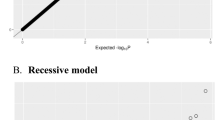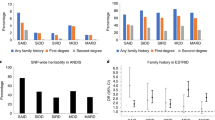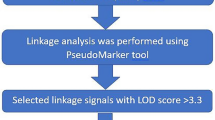Abstract
To reassess earlier suggested type I diabetes (T1D) associations of the insulin receptor substrate 1 (IRS1) and the paired domain 4 gene (PAX4) genes, the Type I Diabetes Genetics Consortium (T1DGC) evaluated single-nucleotide polymorphisms (SNPs) covering the two genomic regions. Sixteen SNPs were evaluated for IRS1 and 10 for PAX4. Both genes are biological candidate genes for T1D. Genotyping was performed in 2300 T1D families on both Illumina and Sequenom genotyping platforms. Data quality and concordance between the platforms were assessed for each SNP. Transmission disequilibrium testing neither show T1D association of SNPs in the two genes, nor did haplotype analysis. In conclusion, the earlier suggested associations of IRS1 and PAX4 to T1D were not supported, suggesting that they may have been false positive results. This highlights the importance of thorough quality control, selection of tagging SNPs, more than one genotyping platform in high throughput studies, and sufficient power to draw solid conclusions in genetic studies of human complex diseases.
This is a preview of subscription content, access via your institution
Access options
Subscribe to this journal
Receive 6 digital issues and online access to articles
$119.00 per year
only $19.83 per issue
Buy this article
- Purchase on Springer Link
- Instant access to full article PDF
Prices may be subject to local taxes which are calculated during checkout

Similar content being viewed by others
References
Almind K, Inoue G, Pedersen O, Kahn CR . A common amino acid polymorphism in IRS-1 causes impaired insulin signaling: evidence from transfection studies. J Clin Invest 1996; 97: 2569–2575.
Stumvoll M, Fritsche A, Volk A, Stefan N, Madaus A, Maerker E et al. The Gly972Arg polymorphism in the insulin receptor substrate-1 gene contributes to the variation in insulin secretion in normal glucose-tolerant humans. Diabetes 2001; 50: 882–885.
Almind K, Bjorbaek C, Vestergaard H, Hansen T, Echwald S, Pedersen O . Amino acid polymorphisms of insulin receptor substrate-1 in. Lancet 1993; 342: 828–832.
Hitman GA, Hawrami K, McCarthy MI, Viswanathan M, Snehalatha C, Ramachandran A et al. Insulin receptor substrate-1 gene mutations in NIDDM; Implications for the study of polygenic disease. Diabetologia 1995; 38: 481–486.
Jellema A, Zeegers MPA, Feskens EJM, Dagnelie PC, Mensink RP . GlY972Arg variant in the insulin receptor substrate-1 gene and association with Type 2 diabetes: a meta-analysis of 27 studies. Diabetologia 2003; 46: 990–995.
Florez JC, Sjogren M, Burtt N, Orho-Melander M, Schayer S, Sun M et al. Association testing in 9000 people fails to confirm the association of the insulin receptor substrate-1 G972R polymorphism with type 2 diabetes. Diabetes 2004; 53: 3313–3318.
Wellcome Trust Case Control Consortium. Genome-wide association study of 14,000 cases of seven common diseases and 3,000 shared controls. Nature 2007; 447: 661–678.
Zeggini E, Parkinson J, Halford S, Owen KR, Frayling TM, Walker M et al. Association studies of insulin receptor substrate 1 gene (IRS1) variants in type 2 diabetes samples enriched for family history and early age of onset. Diabetes 2004; 53: 3319–3322.
Rung J, Cauchi S, Albrechtsen A, Shen L, Rocheleau G, Cavalcanti-Proenca C et al. Genetic variant near IRS1 is associated with type 2 diabetes, insulin resistance and hyperinsulinemia. Nat Genet 2009; 41: 1110–1115.
Federici M, Petrone A, Porzio O, Bizzarri C, Lauro D, D'Alfonso R et al. The Gly972fwdarwArg IRS-1 variant is associated with type 1 diabetes in continental Italy. Diabetes 2003; 52: 887–890.
Morrison VA, Onengut-Gumuscu S, Concannon P . A functional variant of IRS1 is associated with type 1 diabetes in families from the US and UK. Mol Genet Metab 2004; 81: 291–294.
Eftychi C, Howson JM, Barratt BJ, Vella A, Payne F, Smyth DJ et al. Analysis of the type 2 diabetes-associated single nucleotide polymorphisms in the genes IRS1, KCNJ11, and PPARG2 in type 1 diabetes. Diabetes 2004; 53: 870–873.
Johansen A, Jensen DP, Bergholdt R, Mortensen HB, Pociot F, Nerup J et al. IRS1, KCNJ11, PPARgamma2 and HNF-1alpha: do amino acid polymorphisms in these candidate genes support a shared aetiology between type 1 and type 2 diabetes? Diabetes Obes Metab 2006; 8: 75–82.
Cooper JD, Smyth DJ, Smiles AM, Plagnol V, Walker NM, Allen JE et al. Meta-analysis of genome-wide association study data identifies additional type 1 diabetes risk loci. Nat Genet 2008; 40: 1399–1401.
Hakonarson H, Grant SFA, Bradfield JP, Marchand L, Kim CE, Glessner JT et al. A genome-wide association study identifies KIAA0350 as a type 1 diabetes gene. Nature 2007; 448: 591–594.
Mansouri A, St-Onge L, Gruss P . Role of Pax genes in endoderm-derived organs. Trends Endocrinol Metab 1999; 10: 164–167.
Sosa-Pineda B, Chowdhury K, Torres M, Oliver G, Gruss P . The Pax4 gene is essential for differentiation of insulin-producing beta cells in the mammalian pancreas. Nature 1997; 386: 399–402.
Brun T, Gauthier BR . A focus on the role of Pax4 in mature pancreatic islet beta-cell expansion and survival in health and disease. J Mol Endocrinol 2008; 40: 37–45.
Kanatsuka A, Tokuyama Y, Nozaki O, Matsui K, Egashira T . Beta-cell dysfunction in late-onset diabetic subjects carrying homozygous mutation in transcription factors NeuroD1 and Pax4. Metabolism 2002; 51: 1161–1165.
Mauvais-Jarvis F, Sobngwi E, Porcher R, Riveline JP, Kevorkian JP, Vaisse C et al. Ketosis-prone type 2 diabetes in patients of sub-Saharan African origin: clinical pathophysiology and natural history of beta-cell dysfunction and insulin resistance. Diabetes 2004; 53: 645–653.
Shimajiri Y, Sanke T, Furuta H, Hanabusa T, Nakagawa T, Fujitani Y et al. A missense mutation of Pax4 gene (R121W) is associated with type 2 diabetes in Japanese. Diabetes 2001; 50: 2864–2869.
Shimajiri Y, Shimabukuro M, Tomoyose T, Yogi H, Komiya I, Takasu N . PAX4 mutation (R121W) as a prodiabetic variant in Okinawans. Biochem Biophys Res Commun 2003; 302: 342–344.
Tokuyama Y, Matsui K, Ishizuka T, Egashira T, Kanatsuka A . The Arg121Trp variant in PAX4 gene is associated with beta-cell dysfunction in Japanese subjects with type 2 diabetes mellitus. Metabolism 2006; 55: 213–216.
Biason-Lauber A, Boehm B, Lang-Muritano M, Gauthier BR, Brun T, Wollheim CB et al. Association of childhood type 1 diabetes mellitus with a variant of PAX4: possible link to beta cell regenerative capacity. Diabetolog 2005; 48: 900–905.
Geng DG, Liu SY, Steck A, Eisenbarth G, Rewers M, She JX . Comment on: Biason-Lauber A, Boehm B, Lang-Muritano M et al. (2005) Association of childhood type 1 diabetes mellitus with a variant of PAX4: possible link to beta cell regenerative capacity. Diabetologia 48: 900–905. Diabetologia 2006; 49: 215–216.
Gylvin T, Bergholdt R, Nerup J, Pociot F . Reply to: Biason-Lauber A, Boehm B, Lang-Muritano M et al. (2005) Association of childhood type 1 diabetes mellitus with a variant of PAX4: possible link to beta cell regenerative capacity. Diabetologia 48: 900–905. Diabetolog 2005; 48: 2183–2184.
Hermann R, Mantere J, Lipponen K, Veijola R, Soltesz G, Otonkoski T et al. Lack of association of PAX4 gene with type 1 diabetes in the Finnish and Hungarian populations. Diabetes 2005; 54: 2816–2819.
Martin RJ, Savage DA, Carson DJ, Maxwell AP, Patterson CC . The PAX4 gene variant A1168C is not associated with early onset Type 1 diabetes in a UK population. Diab Med 2006; 23: 927–928.
Barrett J, Clayton D, Concannon P, Akolkar B, Erlich HA, Julier C et al. Genome-wide association study and meta-analysis find that over 40 loci affect risk of type 1 diabetes. Nat Genet 2009; 41: 703–707.
Dudbridge F . Pedigree disequilibrium tests for multilocus haplotypes. Genet Epidemiol 2003; 25: 115–121.
Brown WM, Pierce JJ, Hilner JE, Perdue LH, Lohman K, Lu L et al. and the Type I Diabetes Genetics Consortium. Overview of the Rapid Response data. Genes Immun 2009; 10(Suppl 1): S5–S15.
Purcell S, Neale B, Todd-Brown K, Thomas L, Ferreira MA, Bender D et al. PLINK: a tool set for whole-genome association and population-based linkage analyses. Am J Hum Genet 2007; 81: 559–575.
Acknowledgements
This research uses resources provided by the Type I Diabetes Genetics Consortium, a collaborative clinical study sponsored by the National Institute of Diabetes and Digestive and Kidney Diseases (NIDDK), National Institute of Allergy and Infectious Diseases (NIAID), National Human Genome Research Institute (NHGRI), National Institute of Child Health and Human Development (NICHD), and Juvenile Diabetes Research Foundation International (JDRF) and supported by U01 DK062418. We thank all the T1D families for their participation in the study. R Bergholdt was supported by a grant from the Danish Medical Research Council (271-05-0672). Genotyping was performed at the Broad Institute Center for Genotyping and Analysis is supported by grant U54 RR020278 from the National Center for Research Resources. BOB was support by the German Research Foundation (DFG: SFB 518 & GrK 1041).
Author information
Authors and Affiliations
Consortia
Corresponding author
Rights and permissions
About this article
Cite this article
Bergholdt, R., Brorsson, C., Boehm, B. et al. No association of the IRS1 and PAX4 genes with type I diabetes. Genes Immun 10 (Suppl 1), S49–S53 (2009). https://doi.org/10.1038/gene.2009.91
Published:
Issue Date:
DOI: https://doi.org/10.1038/gene.2009.91
Keywords
This article is cited by
-
Overview of the Type I Diabetes Genetics Consortium
Genes & Immunity (2009)
-
Analysis of 19 genes for association with type I diabetes in the Type I Diabetes Genetics Consortium families
Genes & Immunity (2009)
-
The Type I Diabetes Genetics Consortium ‘Rapid Response’ family-based candidate gene study: strategy, genes selection, and main outcome
Genes & Immunity (2009)



